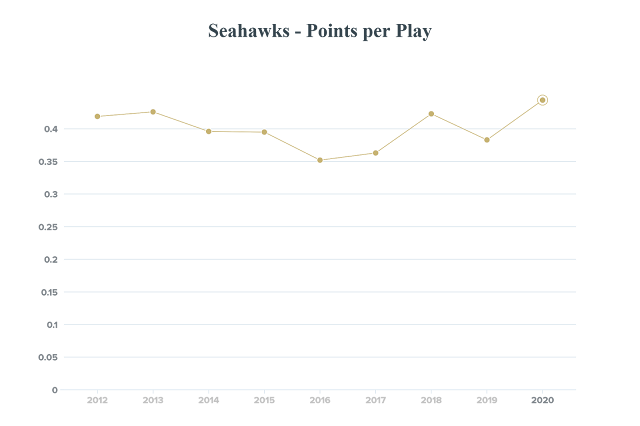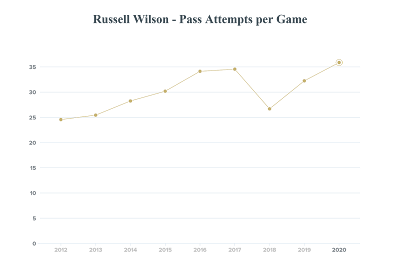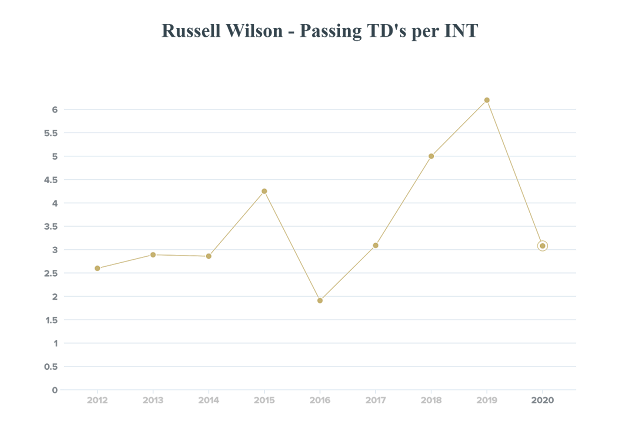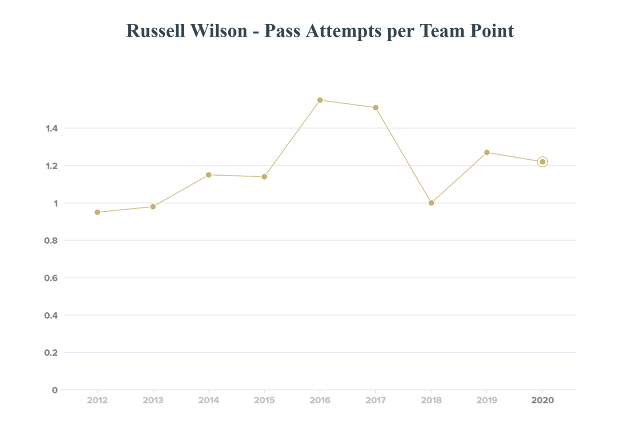Given that I am a Seahawks fan, it is apropos to dive WAY too deep into a path forward for Russell Wilson.
Brian Schottenheimer is gone, and the next offensive coordinator and playcaller will change everything about this team, most likely attempting to refocus the team towards Pete Carroll's main philosophies.
Pete always starts with one of his catchphrases: "it's all about the ball", which roughly translates to (1) create turnovers on defense, (2) prevent turnovers on offense, and (3) play ball control through a physical run game. Other core aspects include a defense that consistently stops the run and limits explosive plays, as well as an offense that creates explosive plays.
Given those items, plus the fan base's desire to "let Russ cook" contrasted with Pete's desire to "run the ball more", it's time to see what would unlock Russell Wilson's best.
Did Brian "let Russ cook"? By this standard, yes.
Was it Pete's flavor? Not so much, as wee can see from the next graph.
Russell's most efficient year in terms of passing touchdown's per interception thrown was 2019 (6.2 to 1), and it wasn't especially close. That fell to a rate of 3.08 TD's per INT this year, which isn't "bad" by an NFL standard, but is still less than half as efficient (in terms of scoring) as the previous year.
My suspicion is that Pete allowed the "cooking" movement to start the 2020 season due to Russell's incredible efficiency last year, but once he hit a turnover streak in the middle of the season (10 in 4 games), Pete became much more cautious.
One core issue at play is this: though QB is the most important position on any football team, Pete assigns less value to it than other head coaches (not "de-valuing", per se, but rather "de-centralizing"). As can be observed from these next data points, QB play (in Pete's Seahawks teams) has some correlation to points scored, but not necessarily post-season success.

This year's Seahawks team scored the most points per play in Wilson's tenure as a Seahawk. However, both Super Bowl runs (2013 and 2014) look very different from the following years. During that two-year span, RW threw the ball less, had a worse TD-INT ratio (still above league average), and yet they scored more frequently per pass attempt and per play than most other seasons.
Most common reasons given: the Legion of Boom, Beast Mode, an incredible special teams unit, and, in essence, a team that de-centralized the quarterback position.
Every aspect of those teams was a threat. Any unit could score. Anyone could get a turnover (and yes, PC always philosophically counts "three-and-outs" as turnovers to the credit of the defense). That was Pete's definition of complementary football.
Granted, we could (and should) look at playcalling, offensive schemes, the use of play action, Russell's athleticism, and many other factors that impact the game, but there is a clear takeaway here. Pete wants this team to run HIS version of football again, and he has made that clear in multiple interviews. He believes that he knows the best, most consistent, most reliable way to win football games and establish a winning culture long-term, and he does not believe that the formula involves putting all the eggs in one basket.
Russell is known to be an incredibly humble human being, but this transition is the test: is he willing to "go back" to being the best "game manager" to ever play the game?
Is he willing to sacrifice personal statistical achievement in order to continue building postseason success and a Hall of Fame postseason resume?
Time will tell.



No comments:
Post a Comment